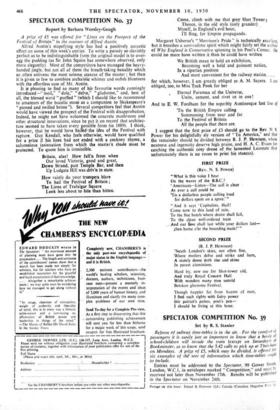SPECTATOR COMPETITION No. 37
Report by Barbara Worsley-Gough A prize of £5 was offered for "Lines on the Prospect of the Festival of Britain" in the manner of Alfred Austin.
Alfred Austin's stupefying style has had a positively narcotic effect on some of this week's entries. To write a parody so slavishly perfect as to be indistinguishable from the original model is to over- egg the pudding (as Sir John Squire has somewhere observed, only more elegantly). Most of the competitors have managed the heavy- handed jingle, but not all of them the breath-taking banality which so often enlivens the most solemn stanzas of the master ; but then it is given to few to combine archaistic whimsy and oafish bluntness with the effortless ease of Mr. Austin.
It is pleasing to find so many of his favourite words cunningly introduced—" moil," "dole," "delve," "gladsome," and, best of all, the blessed word " purfled " (which I should like to recommend to amateurs of the bucolic muse as a companion to Shakespeare's " pioned and twilled brims "). Several competitors feel that Austin would have viewed the prospect of the Festival with disapprobation. Indeed, he might not have welcomed the concrete mushroom and other structural innovations, since he put it on record that architec- ture seemed to have taken every possible form (in 1889). I think, however, that he would have hailed the idea of the Festival with rapture. Guy Kendall, who feels otherwise, would have qualified for a prize if his lines had not ended with a cockney rhyme, a calumnious insinuation from which the master's shade must be protected. To quote him is irresistible.
Britain, alas! How fall'n from when Our loved Victoria, good and great, Down Strand, past Temple Bar, and then Up Ludgate Hill was driv'n in state.
How vainly do your trumpets blare To hail the Festival of Britain ; The Lions of Trafalgar Square Look less about to bite than bitten. Come, climb with me that grey Shot Tower Thence, in the old style (only grander) Myself, in England's evil hour, I'll fling, for Empire propaganda.
Margaret Usborne's " Morrison's Pride" is technically exce:lent, but it breathes a sans-culotte spirit which might fairly set the author of Why England is Conservative spinning in his Poet's Corner. He could no more have written it than he could have written
We British mean to hold an exhibition, Becoming well a bold and puissant nation, In a riparian position And most convenient for the railway station....
for which, however, I am greatly obliged to A. M. Sayers. I am obliged, too, to Miss Tuck Pook for her
Eternal Foreman of the Universe, Unite, cement, and rivet us in one!
And to E. W. Fordham for the superbly Austinesque last line of
'Tis the British Empire calling Summoning from near and far To the Festival of Britain All the people that there are.
I suggest that the first prize of should go to the Rev. N. S. Power for his delightfully sly version of "To America," and that the remainder should be divided between R. J. P. Hewison, whose neatness and ingenuity deserve high praise, and H. A. C. Evans for catching the authentic cosy drone of the lamented Laureate (but unfortunately there is no room to print his stanzas).
FIRST PRIZE (Ray. N. S. PowEtt)
"What is this voice I hear
On the waves of the B.B.C.? Americans—Listen--The call is clear As ever a call could be 'Tis a dollarless people calling loud for dollars spent on a spree.'" "And it says 'Capitalists, Hail!
Come now to this land of rain, To the fine hotels where desire shall fail, To the clean well-ordered train
And our liave shall last while your dollars last—
,then home o'er the bounding main!'"
SECOND PRIZE
(R. I. P. HEwtsoN) 'Neath London's skies, not often fine, Where moilers delve and strike and hum, A stately dome doth rise and shine In purest aluminium.
Hard by, new use for Shot-tower old, And truly Royal Concert Hall With wonders many moe untold Betoken gleesome Festival.
Though happier far from haunts of men, I find such rights with faery power Stir patriot's pulses, poet's pen— I should be living at this hour.


















































 Previous page
Previous page